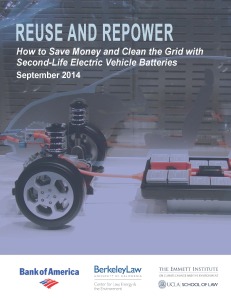UCLA / UC Berkeley Law Report On Harvesting Electric Vehicle Batteries For Grid Storage
Joint law school report will be discussed at a webinar on Friday at 10am
 As I blogged about last week, California and the nation may have a golden opportunity to harvest used electric vehicle batteries for inexpensive energy storage. These repurposed batteries can be stacked for bulk storage to absorb surplus renewable energy for cloudy and dark windless times. They can save ratepayers money, clean the grid, and potentially help bring down the cost of electric vehicles, encouraging more people to switch from gas engines to cleaner electrics.
As I blogged about last week, California and the nation may have a golden opportunity to harvest used electric vehicle batteries for inexpensive energy storage. These repurposed batteries can be stacked for bulk storage to absorb surplus renewable energy for cloudy and dark windless times. They can save ratepayers money, clean the grid, and potentially help bring down the cost of electric vehicles, encouraging more people to switch from gas engines to cleaner electrics.
The numbers are compelling: California now has over 100,000 electric vehicles on the road today, with a goal of 1.5 million by 2025. Assuming 50 percent of the battery packs can be repurposed, with 75 percent of their original capacity, the “second-life” batteries on the road in just ten years could store and dispatch enough electricity to power 4.5 million households in any given moment, equivalent to almost 10 percent of the state’s installed power capacity.
But the market for these batteries is still new and uncertain. Used electric vehicle batteries are only just now being deployed in various grid scenarios, and automakers are concerned about uncertain liability in the event of damages, as well as the complex regulatory environment facing energy storage technologies in general.
To address the challenges and offer solutions, UCLA and UC Berkeley Schools of Law are today releasing the report Reuse and Repower: How to Save Money and Clean the Grid With Second-Life Electric Vehicle Batteries. The report resulted from a one-day gathering of industry experts, including automakers, renewable energy developers, battery leaders, and utilities. It is the thirteenth in the law schools’ Climate Change and Business Research Initiative, sponsored by Bank of America, which develops policies that help businesses prosper in an era of climate change.
The report recommends that policy makers:
- support and partner with automakers, utilities, and other private sector entities to develop more second-life battery demonstration projects to document the market potential;
- Partner with industry leaders to identify and address the regulatory conflicts that limit the second-life battery market (often unintentionally); and
- Work with stakeholders to clarify product liability rules based on second-life battery performance standards.
To hear more about the report and the topic, UC Berkeley Law will be hosting a webinar this Friday from 10 to 11am with:
- Adam Langton, Senior Energy Analyst, California Public Utilities Commission
- Randall Winston, Special Assistant to the Executive Secretary, Office of Governor Edmund G Brown, Jr.
More information on the event can be found here, including the registration page. The webinar will include more details on the report’s key findings and will have time for questions from the audience.
UPDATE: The webinar is now on-line and can be watched here:
[youtube http://www.youtube.com/watch?v=K3Zq8VlXYXY]







Reader Comments